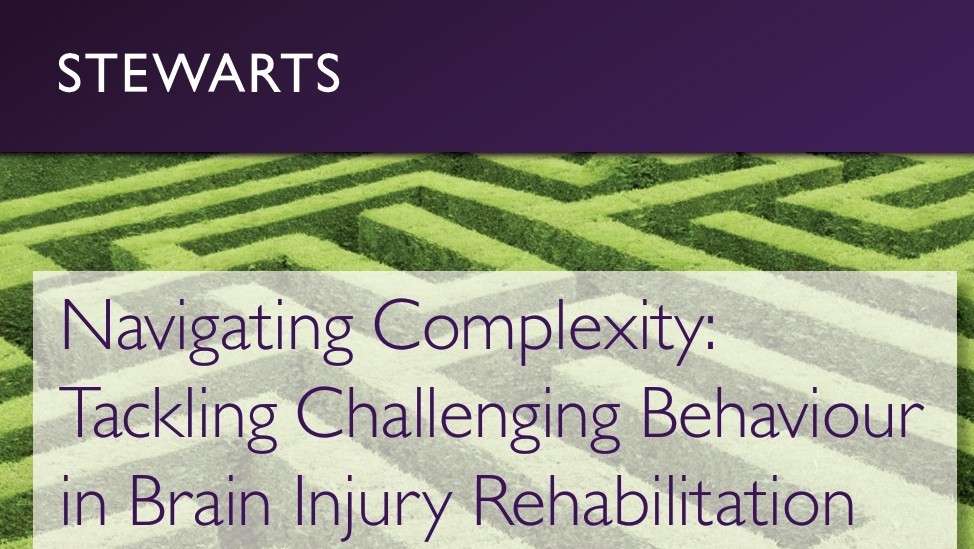
posted 19th September 2025
Understanding and managing challenging behaviour in individuals with traumatic brain injury requires more than clinical expertise—it demands empathy, collaboration, and a commitment to person-centred care. At a recent event held by Stewarts, leading voices from neuropsychology, neuropsychiatry, nursing, and legal practice came together to share their insights on how to support patients with complex behavioural needs.
Dr Donald Brechin: Behaviour as Communication
Dr Donald Brechin opened the session with a compelling presentation on behaviours that challenge in clinical and care settings. He reframed these behaviours as expressions of unmet needs or responses to environmental stressors, urging professionals to interpret them within their emotional and contextual landscape.
Central to his approach was the Three Systems Model of Emotional Regulation, a framework that helps individuals recognise and manage their emotional responses. Dr Brechin emphasised that effective intervention begins with identifying triggers and precursors to behaviour, and should be delivered in a values-driven, person-centred manner.
He also outlined the development of Behaviour Support Plans, which include proactive strategies tailored to the individual. These plans are most effective when created collaboratively within a multidisciplinary team, ensuring care is holistic and aligned with the person’s goals.
Dr Mike Dilley: Psychiatric Complexity and Early Intervention
Dr Mike Dilley brought his deep expertise in neuropsychiatry to the conversation, highlighting the range of psychiatric conditions that can affect individuals with brain injury. These conditions often manifest through behaviours that challenge, requiring careful and comprehensive medical assessment.
He advocated for a multi-dimensional diagnostic approach—combining behavioural observation, neuropsychological assessment, and neuroimaging—to fully understand a patient’s cognitive and emotional profile. Dr Dilley also cautioned against over-reliance on pharmacological treatments, noting the limited evidence base and the need for case-by-case decision-making. His recommendation: prioritise early intervention and interdisciplinary management, to ensure responsive, tailored care.
Jo Lockwood-Smith: Nursing with Compassion and Courage
Jo Lockwood-Smith, Nurse Consultant for Major Trauma at Imperial College Healthcare NHS Trust, shared her frontline experience of nursing patients with challenging behaviours. Her passion for high-quality, patient-centred care was evident throughout her talk.
Jo provided practical insights into managing high-risk patients with traumatic brain injuries, balancing safety with dignity, and navigating the emotional demands of bedside care. Her presentation included poignant examples from her clinical journey, illustrating the difficult decisions nurses face when shaping treatment plans. She also addressed the impact of challenging behaviour on nursing teams, highlighting the emotional strain and ethical dilemmas involved—and the need for robust support systems.
Hayley Symington: Legal Advocacy in Neurorehabilitation
Hayley Symington, Senior Associate Solicitor at Stewarts, offered a vital reminder of the role legal professionals play in the neurorehabilitation journey. Her presentation emphasised the importance of integrating the legal team into a collaborative, multidisciplinary approach.
Through two compelling case studies, Hayley illustrated the complexities of navigating legal processes while advocating for person-centred care. She highlighted how early instruction of specialist solicitors can ensure timely access to rehabilitation, safeguard client rights, and align legal strategy with therapeutic goals. Her stories were deeply moving, reminding attendees that behind every case file is a person whose recovery depends on coordinated, compassionate, and expert support.
Final Reflections
Together, these presentations underscored a powerful truth: behaviours that challenge are not just clinical symptoms—they are human signals. Whether through clinical insight, nursing care, or legal advocacy, supporting individuals with brain injury requires empathy, collaboration, and a shared commitment to dignity and recovery.
🧠 At Key Case Management, our clients are at the heart of everything we do. With a team of experienced clinical case manager associates, we specialise in supporting individuals with brain injuries through every step of their rehabilitation journey.
✅ Our CQC registration for Personal Care and Treatment of Disease, Disorder and Injury (TDDI), combined with our nurse-led service, enables us to design and manage complex community care packages tailored to each client’s needs.
We’re proud to deliver compassionate, coordinated care that empowers recovery and promotes independence. #CaseManagement #BrainInjuryRehabilitation #Neurorehab #PersonCentredCare #CQCRegistered #CommunityCare #KeyCaseManagement





